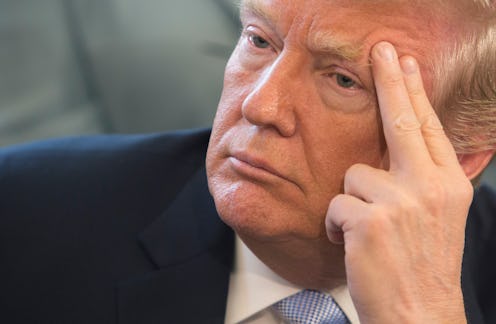News
All Presidents Have To Pay Taxes — But That Doesn't Mean You'll See Trump's Returns

Donald Trump's taxes have long been a subject of controversy. Prior to his election as president, many clamored for Trump to release his tax returns and adhere to a longstanding tradition among American presidential nominees. However, Trump ultimately refused to release his returns and still has not done so as president. Indeed, now that he is president, you may be wondering if Trump even pays taxes. In short, presidents, Trump included, are required to file tax returns. However, it is unlikely that Trump will be making his 2017 return — or any return for that matter — public anytime soon.
As the Fiscal Times reported in a 2016 article, there is no presidential exemption for tax payments. Presidents, like all Americans, are required to file income taxes by tax day. As Jackie Perlman, a senior tax research analyst with the Tax Institute at H&R Block, told the Fiscal Times, "U.S. presidents are governed by the same laws and regulations to which all taxpayers are subject." However, she also added that presidential filings may be more complex than the average American's, saying:
U.S. presidents likely have some of the more complicated tax returns because of their income – both in terms of dollars and variety of sources – and deductions claimed for the same reason.
Thus, Trump is required by law to file taxes, even as president. However, it is pretty unlikely that the public will see his 2017 tax return, considering his historic reluctance to release any returns. For example, during the 2016 presidential campaign, Trump repeatedly refused to release his returns, saying that he was under audit by the IRS and that he would release them when the audit was finished.
However, shortly after he became president, Trump indicated he would not be releasing his tax returns at all. In January 2017, on ABC's This Week, advisor Kellyanne Conway commented on a petition demanding that Trump release his tax returns, saying "The White House response is that he's not going to release his tax returns." As the Washington Post reported, she also noted that people "didn't care" whether Trump released his returns and that "... Most Americans are very focused on what their tax returns will look like while President Trump is in office, not what his look like ..."
As ABC News reported, in contrast to Conway's statement, many Americans were actually very interested in seeing Trump's tax returns. An ABC News/Washington Post survey conducted in January 2017 actually found that around three-fourths of Americans wished to see them.
As reported by the New York Times, Americans were given a glimmer of insight into Trump's tax filing history when MSNBC’s Rachel Maddow and former New York Times reporter David Cay Johnston obtained a copy of Trump's 2005 return in March 2017. The return revealed that Trump had paid $38 million in income taxes on an income of $150 million.
The New York Times also obtained a partial copy of Trump's 1995 tax return in October 2016. The outlet revealed that Trump had declared a $916 million loss on this return. As the paper described, this loss declaration could have legally allowed him to avoid paying federal income taxes for up to 18 years, as the loss could offset the same amount of taxable income over that time period.
At the time, the Trump campaign did not comment directly on the $916 million loss. Instead, it released a statement to the New York Times saying,
Mr. Trump is a highly-skilled businessman who has a fiduciary responsibility to his business, his family and his employees to pay no more tax than legally required ... That being said, Mr. Trump has paid hundreds of millions of dollars in property taxes, sales and excise taxes, real estate taxes, city taxes, state taxes, employee taxes and federal taxes.
Thus, while Trump is required to pay taxes, he is not compelled to release them to the public. According to CNN, if Congress really wanted to acquire Trump's tax returns, the law allows the the chairman of the House Ways and Means Committee, the Joint Committee on Taxation, or the Senate Finance Committee to request them for review. The committee chairs could share the returns with their committees in closed sessions and, if there was a compelling reason to do so, release the records to Congress as a whole. However, with a Republican majority House and Senate, it seems quite unlikely that Trump's tax returns will be made public anytime in the near future.